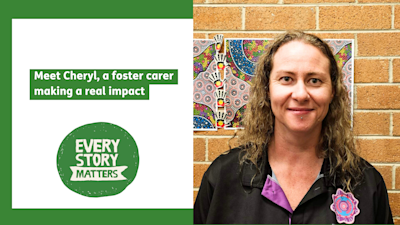I couldn’t change the past, but I could provide safe opportunities to experience the wonders of childhood.

Donna Confetti wears several hats: a foster carer, a social worker/counsellor and an arts therapist, to name a few. Now in her 17th year as a carer, Donna has provided care for 45 children, and has two young people in her care.
Donna says the boundaries between her role as a foster carer at home and in her professional life can be blurred at times; but she believes one of the most important attributes in both roles is to ensure active and sincere listening.
Given we have faced one of the most challenging years, where we need to watch out for everyone’s mental health, particularly those children in our care, this has never been more important.
“Navigating hard conversations about mental health issues with kids is always guided by sincere listening,” said Donna.
“This is harder than you would expect.”
“Lots of kids just do not have the language to express feelings; behaviours are the inarticulate, desperate attempts to communicate.”
One of the opportunities Donna uses to help bridge this language gap is to use art therapy – she says children usually respond positively to it, where they might baulk at more ‘interview’ style therapy.
“Art therapy provides a framework to engage with emotional and mental challenges that are difficult to express in verbal based therapies,” said Donna.
“The experiences that expressive arts enable, embodies psychological insight and healing.”
Donna says car rides are also good opportunities to have important discussions with children and young people. “There is no eye contact as you are travelling in the same direction – this is a bonus for awkward topics.”

Donna’s own life story includes being a ward of the state. A sole parent, she tragically lost her own child who accidentally drowned at 23 months in 1977. She has been a passionate advocate for positive and supportive therapeutic relationships with children in out-of-home care since she graduated as a Social Worker in 2007.
“When I graduated with my social work degree, I decided I wanted to locate my practice in the day-in-day-out journeys of children in out-of-home care. I could not imagine working in a government department or NGO.
“I wanted to offer healing experiences to help kids acquire a new future. I couldn’t change the past, but I could provide safe opportunities to experience the wonders of childhood. Maybe the happy memories we made would alleviate some of the neglect, abuse and trauma of the past?
“With each child, I get to share part of their discoveries as they unfold into fresh narratives and new possibilities.”
Donna thinks therapy is too often undertaken in a clinical setting.
“We really need to meet kids where they are at, rather than expecting them to perform in the little theatres of clinical convenience where the current issue needs to be dealt with in an hour-long session.
“In real life, I have found the issues are revealed in snippets over time. The things that are bothering a child will emerge in play and jokes and expressive arts more often than in an interview.
“Likewise, the responses can be best delivered in small snippets that are easier for the child to absorb. This is where deep listening is so useful; if you can really observe and understand from the child’s point of view, you can address the concerns in targeted and meaningful ways.”
Donna says her social work also finds her working with parents whose children are in out of home care.
“This gives me a deeper appreciation of the parent’s perspective and I welcome the opportunity to work empathically with all stakeholders part of the broader system.”
Donna also believes there is much that can be done to help carers in terms of helping to manage their professional commitments, financial planning, and issues such as superannuation remediation.
“Smashing the taboos around discussing the financial impacts of fostering on a host family would benefit from some research and reform,” she said.


